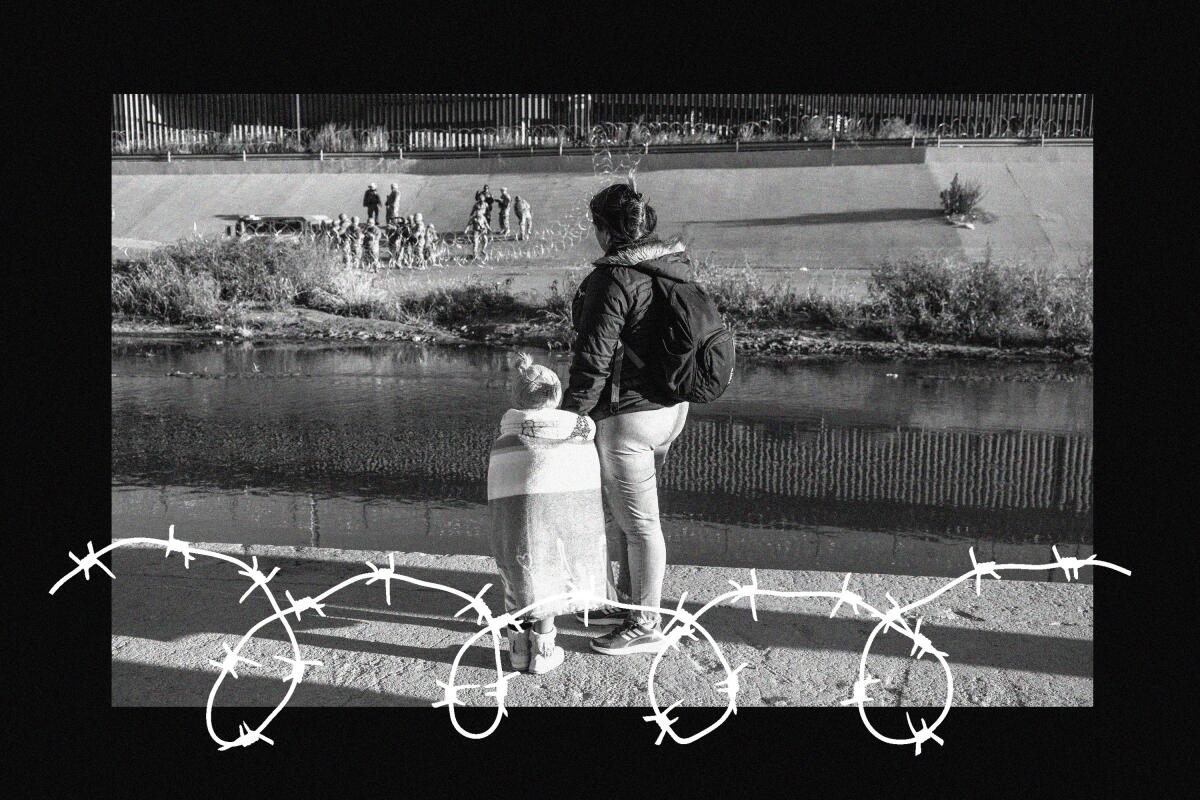Latinx Files: Immigration and border take center stage again

- Share via
What’s the difference between a Democrat and a Republican? When it comes to immigration, it’s harder to tell these days.
The Biden administration announced last Thursday the implementation of a new immigration policy that would expand Title 42 — the once obscure public health law first used by former President Trump — to quickly expel people from the border.
The policy would also allow 30,000 people per month from Cuba, Venezuela, Nicaragua and Haiti to apply for a humanitarian parole program through an online portal that would allow them to live and work legally in the United States.
Per my colleagues Hamed Aleaziz and Courtney Subramanian, “migrants can apply from anywhere, but must not cross the borders of Mexico, Panama or the U.S. without authorization.” They will also “be required to have U.S.-based financial sponsors and pass rigorous background checks.”
Additionally, Mexico has also agreed to take in 30,000 migrants from these four countries.
The announcement comes on the heels of record migration — U.S. Border Patrol made more than 2.2 million arrests at the border during the 2022 fiscal year. The influx of people has put a strain on border communities. In December, El Paso Mayor Oscar Leeser issued a disaster declaration asking the state of Texas to help with the migrant humanitarian crisis. Texas, in turn, bused hundreds of migrants out of the state.
President Biden’s new policy was immediately criticized by members of his own party and immigration advocates alike.
The Latinx experience chronicled
Get the Latinx Files newsletter for stories that capture the multitudes within our communities.
You may occasionally receive promotional content from the Los Angeles Times.
“While we understand the challenges the nation is facing at the Southern border exacerbated by Republican obstruction to modernizing our immigration system, we are deeply disappointed by the Biden Administration’s decision to expand the use of Title 42,” U.S. Sens. Robert Menendez (D-N.J.), Cory Booker (D-N.J.), Ben Ray Luján (D-N.M.) and Alex Padilla (D-Calif.) said in a joint statement. “Continuing to use this failed and inhumane Trump-era policy put in place to address a public health crisis will do nothing to restore the rule of law at the border.”
“Opening up new limited pathways for a small percentage of people does not obscure the fact that the Biden administration is illegally and immorally gutting access to humanitarian protections for the majority of people who have already fled their country seeking freedom and safety,” said Sunil Varghese, policy director at the International Refugee Assistance Project.
If part of Biden’s plan was to assuage criticism from the right that he isn’t doing enough regarding border security, it didn’t work. On Sunday, Texas Gov. Greg Abbott greeted Biden at the El Paso airport — his first presidential visit to the borderlands — not with a thank you but with a letter demanding that he do more. On Monday, Texas Republican Rep. Pat Fallon introduced articles of impeachment against Homeland Security Secretary Alejandro N. Mayorkas, the Cuban American face of Biden’s immigration policy.
It’s too soon to tell whether Biden’s new approach will stop the flow of people coming to the border seeking asylum, but history leads me to believe that it won’t. As my colleague Kate Linthicum points out, a humanitarian crisis is forming in Mexico — in Juarez, shelters are running out of space.
It’s only going to get worse.
Consider subscribing to the Los Angeles Times
Your support helps us deliver the news that matters most. Become a subscriber.
Things we read this week that we think you should read
— For more on the humanitarian crisis at the border in El Paso, I recommend this comprehensive analysis by Texas Monthly senior editor Jack Herrera.
— In December, Borderless Magazine and Block Club Chicago launched a series of profiles called “After the Buses,” which follows 10 migrants bused to Chicago by Texas Gov. Greg Abbott. Given the recent news, I figured it was a great time to replug it.
— I was on vacation when this personal account by my colleague Melissa Gomez was published, so I didn’t get a chance to promote it in the newsletter, but if you haven’t read it yet, you should do so now. In it, Gomez writes about how the racist leaked audio that rocked L.A. City Hall last fall made her appreciate her Oaxacan roots.
— A big shoutout to Lori Lizarraga, who just started her stint as co-host of the NPR podcast “Code Switch.”
— The Coachella lineup has been unveiled and Bad Bunny is a headliner. El Conejo Malo becomes the first act from Latin America to headline the music festival. For more Coachella news, the Times entertainment desk has you covered.
— Here’s an interesting story from the New York Times about the popularity of President Obama’s Affordable Care Act in an unlikely place: Miami.
— For the Nation, Juan Ignacio Mora wrote this glowing book review of “Making Mexican Chicago: From Postwar Settlement to the Age of Gentrification” by historian Mike Amezcua. The book, according to Mora, tells the story of how Mexicans and Mexican Americans helped shape the Windy City, as well as chronicling the racism and anti-immigrant sentiments that percolated in the city long before the arrival of Trump. (H/T Gustavo Arellano)
The Latinx experience chronicled
Get the Latinx Files newsletter for stories that capture the multitudes within our communities.
You may occasionally receive promotional content from the Los Angeles Times.







